|
|
|
Sort Order |
|
|
|
Items / Page
|
|
|
|
|
|
|
| Srl | Item |
| 1 |
ID:
123195
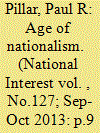

|
|
|
|
|
| Publication |
2013.
|
| Summary/Abstract |
THE URGE to apply era-defining labels to global affairs is strong and enduring. A label and a few easy-to-understand attributes associated with it can impart a reassuring simplicity to what is actually a complex and often-intractable reality. While the disadvantages of era labeling, including oversimplification, are probably as great as the advantages, the practice is here to stay.
|
|
|
|
|
|
|
|
|
|
|
|
|
|
|
|
| 2 |
ID:
111251
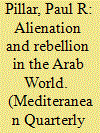

|
|
|
|
|
| Publication |
2011.
|
| Summary/Abstract |
The revolts known collectively as the Arab Spring are largely reactions of alienated populations to the closed economic and political systems that prevail in the Middle East. Revolutions in individual countries have differed because of the differing status of the military, sectarian divisions, and mineral wealth. The prospect of peaceful political change reduces the appeal of extremist ideologies, but extremists still could make inroads to the extent that high popular hopes are dashed. Democracy will need a long time to take root in Arab political cultures.
|
|
|
|
|
|
|
|
|
|
|
|
|
|
|
|
| 3 |
ID:
149499
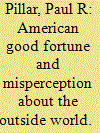

|
|
|
|
|
| Summary/Abstract |
PAUL R. PILLAR assesses how Americans’ unusually favorable circumstances and experiences shape their perceptions of the rest of the world. He argues that as a result of these experiences, American have difficulty understanding the security and economic challenges facing other nations and overestimate how well those nations can create stable democracies.
|
|
|
|
|
|
|
|
|
|
|
|
|
|
|
|
| 4 |
ID:
093706
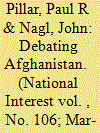

|
|
|
|
|
| Publication |
2010.
|
| Summary/Abstract |
With thirty thousand new boots on the ground, Kabul is set to become the primary focus of Obama's strategic agenda. But is this the right choice? Pillar, former national intelligence officer for the Near East and South Asia, argues that a just intervention has devolved into a worthless quagmire, while Iraq War veteran Nagl believes al-Qaeda must be vanquished in the borderlands of AfPak.
|
|
|
|
|
|
|
|
|
|
|
|
|
|
|
|
| 5 |
ID:
095176
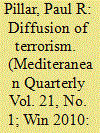

|
|
|
|
|
| Publication |
2010.
|
| Summary/Abstract |
The prevailing perception of the threat from international terrorism is that it emanates chiefly from one group, al Qaeda, it is tied to a territorial presence in South Asia, and it is driven by a fixed ideology bent on inflicting maximum damage on the West. The perception stems more from Western fears and the legacy of past experience than from actual trends in terrorism. The real threat is more diffuse and decentralized, not embodied in any one group or piece of territory, and has more malleable goals and tactics.
|
|
|
|
|
|
|
|
|
|
|
|
|
|
|
|
| 6 |
ID:
145601
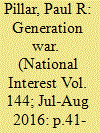

|
|
|
|
|
| Summary/Abstract |
SINCE WORLD WAR II—the largest military effort ever by the United States, and one ending with clear victory—the use of U.S. military force overseas has exhibited two patterns. One is the increasing frequency and duration of the application of force. This trend has become especially noticeable since the turn of the twenty-first century, with the United States fighting its two longest major military campaigns, in Afghanistan and Iraq. Simultaneously, Washington has conducted combat operations in Libya, Syria and elsewhere, all under the indeterminate rubric of “war on terror.” An entire generation of Americans has come of age with its country perpetually at war.
|
|
|
|
|
|
|
|
|
|
|
|
|
|
|
|
| 7 |
ID:
076356
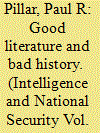

|
|
|
|
|
| Publication |
2006.
|
| Summary/Abstract |
Uncritical acceptance of the findings of the 9/11 Commission has obscured how the commission intentionally misrepresented pre-attack strategic intelligence on the threat from Al Qaeda. The commission staff used such techniques as highly selective use of material, partial truths, irrelevant references, plays on words, quotations out of context, and suggestive language leading to false inferences to portray as weak what had been a strong strategic analytical performance. The commission's misrepresentation corrupted history, damaged public understanding of the role of intelligence in counterterrorism, and helped to build support for a reorganization scheme that has made US counterterrorist intelligence worse rather than better.
|
|
|
|
|
|
|
|
|
|
|
|
|
|
|
|
| 8 |
ID:
070788
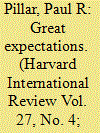

|
|
|
| 9 |
ID:
131298
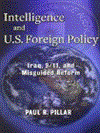

|
|
|
|
|
| Publication |
New York, Columbia University Press, 2014.
|
| Description |
xvi, 413p.Pbk
|
| Standard Number |
9780231157933
|
|
|
|
|
|
|
|
|
|
|
|
Copies: C:1/I:0,R:0,Q:0
Circulation
| Accession# | Call# | Current Location | Status | Policy | Location |
| 057760 | 327.1273/PIL 057760 | Main | On Shelf | General | |
|
|
|
|
| 10 |
ID:
068233
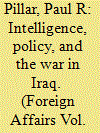

|
|
|
| 11 |
ID:
169421
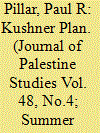

|
|
|
|
|
| Summary/Abstract |
The U.S. administration's Israeli-Palestinian “peace plan,” under President Donald Trump, has so far yielded only an inconclusive talkfest about economic development. The underlying rationale of the plan—that economics must come before any addressing of core political issues—is fundamentally flawed for several reasons. The biggest impediments to Palestinian economic development stem from aspects of the Israeli occupation that would continue under the plan, which rejects a two-state solution and is a slightly revised and renamed version of the current arrangement of limited Palestinian autonomy under Israeli domination. The plan flows directly from the Trump administration's policy of acquiescing in the preferences of the right-wing government of Israel. Accordingly, the political portion of the plan is indefinitely delayed and might never be announced. Keeping the full plan under wraps serves the Israeli government's purpose of holding out the promise of—but never delivering—peace with the Palestinians, while more facts are created on the ground.
|
|
|
|
|
|
|
|
|
|
|
|
|
|
|
|
| 12 |
ID:
057394
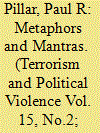

|
|
|
| 13 |
ID:
037311
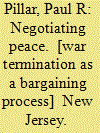

|
|
|
|
|
| Publication |
New Jersey, Princeton University Press, 1983.
|
| Description |
ix, 282p.
|
| Standard Number |
0619076561
|
|
|
|
|
|
|
|
|
|
|
|
Copies: C:1/I:0,R:0,Q:0
Circulation
| Accession# | Call# | Current Location | Status | Policy | Location |
| 030366 | 327.17/PIL 030366 | Main | On Shelf | General | |
|
|
|
|
| 14 |
ID:
122090


|
|
|
| 15 |
ID:
163953
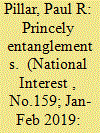

|
|
|
|
|
| Summary/Abstract |
The simple notion that any enemy of my enemy is my friend is overriding sober calculation of how Saudi Arabia’s conduct does or does not support U.S. interests.
|
|
|
|
|
|
|
|
|
|
|
|
|
|
|
|
| 16 |
ID:
148140
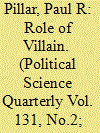

|
|
|
|
|
| Summary/Abstract |
PAUL R. PILLAR examines why Iran has become a major focus of attention of U.S. foreign policy and finds that even a nuclear-armed Iran would not pose the major threat that is commonly assumed. The Iran issue simply fills a traditional American psychological and political need to have a foreign adversary.
|
|
|
|
|
|
|
|
|
|
|
|
|
|
|
|
| 17 |
ID:
123088
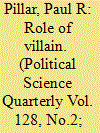

|
|
|
|
|
| Publication |
2013.
|
| Summary/Abstract |
PAUL R. PILLAR examines why Iran has become a major focus of attention of U.S. foreign policy and ?nds that even a nuclear-armed Iran would not pose the major threat that is commonly assumed. The Iran issue simply ?lls a traditional American psychological and political need to have a foreign adversary.
|
|
|
|
|
|
|
|
|
|
|
|
|
|
|
|
| 18 |
ID:
049355
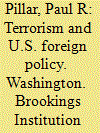

|
|
|
|
|
| Publication |
Washington, Brookings Institution Press, 2001.
|
| Description |
xii, 272p.
|
| Standard Number |
9780815700043
|
|
|
|
|
|
|
|
|
|
|
|
Copies: C:1/I:0,R:0,Q:0
Circulation
| Accession# | Call# | Current Location | Status | Policy | Location |
| 044637 | 303.625/PIL 044637 | Main | On Shelf | General | |
|
|
|
|
| 19 |
ID:
134575
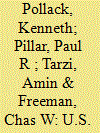

|
|
|
|
|
| Summary/Abstract |
We chose this topic when President Obama gave his speech at West Point in late May of this year. He did say that the United States would use force unilaterally if our core interests were directly threatened. But he emphasized a counterterrorism strategy that would rely upon supporting, training and working with security partners and announced a $5 billion program to support security partners in the Middle East, having identified terrorism as the most direct threat to the United States.
Not long after that, the Islamic State of Iraq in Syria moved down the Tigris River, and the Iraqi security forces retreated, raising the question of how much we can depend upon a strategy like that in Iraq or even in Afghanistan, where we will be leaving soon. He also said that Syria would be a major focus of this strategy. However, we've had a difficult time finding security partners there, because it's a very fragmented opposition and hard to vet and find moderates.
|
|
|
|
|
|
|
|
|
|
|
|
|
|
|
|
| 20 |
ID:
097837
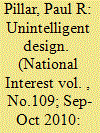

|
|
|
|
|
| Publication |
2010.
|
| Summary/Abstract |
THE POST of director of national intelligence (DNI) has had an unhappy five-year history. Until now it has been easier to blame the successive occupants of the position than to acknowledge the fundamental flaws of the office. Much commentary about the recent ouster of Dennis Blair, for example, has focused on his lack of chemistry with the president, his riling of the Israel lobby by attempting to appoint Chas Freeman to head the National Intelligence Council and a deficiency in political street-fighting skills compared to those of CIA Director Leon Panetta. All those no doubt contributed to Blair's troubles. But one indication that the principal problems are those of the office rather than the occupant is that the job, in such a short time, has now chewed up three able public servants, each of whom excelled in their principal professions (the diplomatic service in the case of the first DNI, John Negroponte, and the military in the cases of Blair and his predecessor, Mike McConnell). More telling still is the difficulty in persuading other able people to take the job. Reportedly, the first to refuse was the future secretary of defense, Robert Gates, one of the most adept officials in Washington at protecting his own reputation; he can certainly recognize a losing hand when he sees one.
|
|
|
|
|
|
|
|
|
|
|
|
|
|
|
|
|
|
|
|
|